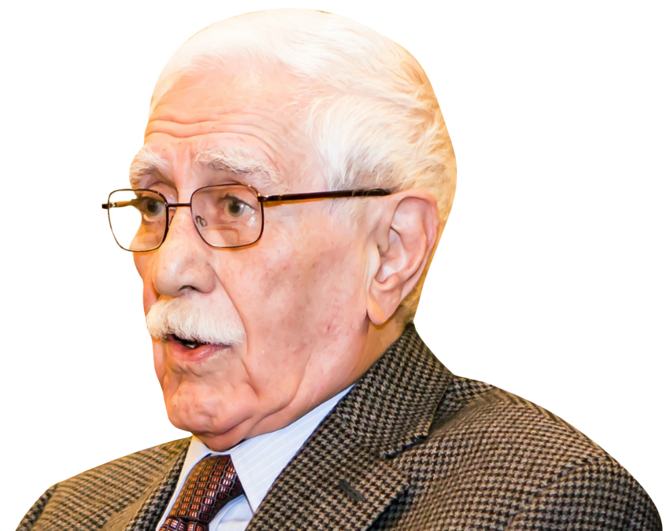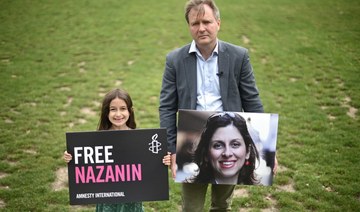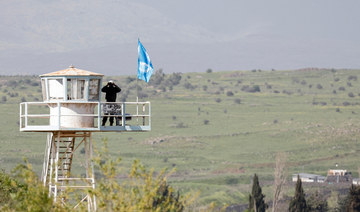TEHRAN: Iraj Pezeshkzad, an Iranian author whose bestselling comic novel, “My Uncle Napoleon,” lampooned Persian culture’s self-aggrandizing and paranoid behavior as the country entered the modern era, has died. He was 94.
The travails of Uncle Napoleon, whose delusions have him seeing Britain’s hand in the troubles plaguing the waning days of his aristocratic family during World War II, became one of the most-beloved television serials ever in Iran when it aired in 1976.
The fervor of the 1979 Islamic Revolution saw the book banned and the series never aired again on Iranian state television. Pezeshkzad himself would ultimately land in Los Angeles, part of an emigre society of Iranians still there that see the California city jokingly referred to as “Tehrangeles” even today.
Pezeshkzad’s words and turns of phrase from the novel still litter Iranian culture today, including raunchy references to “San Francisco” as an innuendo for sexual liaisons. The same goes for passages about the power of love, as described in one scene by Uncle Napoleon’s long-suffering servant, Mash Ghasem.
“When you don’t see her, it’s like your heart is frozen,” says the servant, portrayed in a softly lit basement scene in the series by famed actor Parviz Fannizadeh. “When you see her, it’s like a bakery oven is lit in your heart.”
Iran’s semiofficial ISNA news agency quoted Davood Mosaei, who published Pezeshkzad’s books, as confirming his death on Wednesday. No cause of death was immediately offered. Foreign-based Farsi-language television channels also reported his death.
Iranian state media did not report on his death, though the British ambassador to Iran offered his sympathy. “My sincere condolences and sadness at the passing of one of Iran’s great literary figures — Iraj Pezeshkzad — whose subtle yet powerful satire is an enduring window onto Iranian culture,” Simon Shercliff wrote on Twitter.
Born in Tehran in the late 1920s, Pezeshkzad came of age at the start of Iran’s Pahlavi dynasty. In “My Uncle Napoleon,” he focuses on an aristocratic family from the Qajar dynasty, which had ruled Persia for over 100 years. Several live in a compound with a vast garden, where the story takes place.
The late essayist Christopher Hitchens once referred to the novel as “a love story unfolded in a bildungsroman and wrapped in a conspiracy theory” — using a $10 word for a coming-of-age tale. The narrator loves Uncle Napoleon’s daughter, his cousin, but ultimately never marries her.
But the story does more to explain the mindset of Iranians, who in a generation found themselves dragged from a nearly feudal, rural lifestyle into the modern era of cityscapes. As Persia formally became Iran, it became the target of world powers.
First, Britain and the Soviet Union invaded Iran in 1941 and deposed Shah Reza Pahlavi, worried about his overtures to Adolf Hitler in Germany. His young son, Mohammad Reza Pahlavi, took the throne. In 1953, a CIA- and British-backed coup cemented the shah’s power and overthrew the country’s elected prime minister.
But even before the modern era, weaker Persian dynasties found themselves subsumed by powerful foreign powers. That paranoia bleeds into modern Iran, where its theocracy now finds itself targeted in attacks over its accelerating nuclear program but also has the tendency to blame all its woes on conspirators abroad.
“Although the book is not political, it is politically subversive, targeting a certain mentality and attitude,” wrote author Azar Nafisi in 2006.
“Its protagonist is a small-minded and incompetent personality who blames his failures and his own insignificance on an all-powerful entity, thereby making himself significant and indispensable. “In Iran, for example, as Pezeshkzad has mentioned elsewhere, this attitude is not limited to ‘common’ people but is in fact more prevalent among the so-called political and intellectual elite.”
That’s something Pezeshkzad said came even from birth in his family.
“When I was learning to talk, the words that I heard after bread, water, meat and so on were, ‘Yes. it’s the work of the British,” he once told a 2009 BBC documentary.
The publication of “My Uncle Napoleon” came in the early 1970s, as literacy rates raced upward along with global oil prices, fueling the shah’s modernization efforts in the country. The book sold millions of copies and brought about the televised serial of the same name three years later. Iranians remember streets clearing in Tehran as it aired.
Pezeshkzad himself served as a cultural official in the Foreign Ministry under the shah. But soon, he would flee Tehran forever with the arrival of the Islamic Revolution, joining Iranian Prime Minister Shapour Bakhtiar in Paris and his National Resistance Movement of Iran. Even the shah would blame the Soviets and British for having a hand in being ultimately pushed from power.
“By the time I wrote this novel, everyone had pretty much realized that British imperialism with all its power and greatness had withered away,” he told the BBC. “However, I had underestimated this phobia and especially after the revolution, I realized it was — and still is — extremely strong.”
He described having people praise him for seeing the British hand everything — the exact opposite of what he tried to say in his novel.
“I felt as if a bucket of cold water had been poured over me,” he added.
He later moved to Los Angeles, where he occasionally lectured at universities. In March 2020, he gave an interview to the tabloid Chelcheragh marking the Persian New Year, in which he described being unable to read or write any longer due to macular degeneration.
He said those he once knew in Tehran all had died with age, but he longed to return home one last time.
“I wish I could come to Iran. Visit my city, my own Tehran,” he said. “How can a person not miss his city?”
Iranian author Iraj Pezeshkzad, who wrote ‘My Uncle Napoleon,’ dies
https://arab.news/5btr8
Iranian author Iraj Pezeshkzad, who wrote ‘My Uncle Napoleon,’ dies

- Iranian state media did not report on Pezeshkzad’s death, though the British ambassador to Iran offered his sympathy
Yemen, Egypt presidents discuss Red Sea security
- Houthis claim they are attacking ships to stop Israel’s war on Gaza
RIYADH: The presidents of Egypt and Yemen held talks on Thursday about ways to secure shipping lanes in the Red Sea.
Yemen’s Presidential Leadership Council Chairman Rashad Al-Alimi and Egypt’s President Abdel Fattah El-Sisi met on the sidelines of the Arab League Summit in Bahrain, according to Yemen’s state news agency Saba.
Al-Alimi and El-Sisi emphasized the importance of security in the Red Sea and Gulf of Aden for the region’s stability.
Since November, the Houthis have launched hundreds of ballistic missiles and drones at international commercial and naval ships in the Red Sea, Bab Al-Mandab Strait and the Gulf of Aden. They have reportedly been acting in solidarity with the Palestinian people and want Israel to stop its war on Gaza.
During the meeting, El-Sisi emphasized Egypt’s commitment to Yemen’s unity and stability, and added that Cairo would continue seeking a political solution to the crisis in that country.
Al-Alimi thanked Egypt for its efforts to alleviate suffering in Yemen and for seeking to ensure stability in the region.
Hezbollah introduces new weapons and tactics against Israel as war in Gaza drags on

- Hezbollah has regularly fired missiles across the border with Israel over the past seven months
- Hezbollah said it had launched a new rocket with a heavy warhead named Jihad Mughniyeh
BEIRUT: The Lebanese militant group Hezbollah this week struck a military post in northern Israel using a drone that fired two missiles. The attack wounded three soldiers, one of them seriously, according to the Israeli military.
Hezbollah has regularly fired missiles across the border with Israel over the past seven months, but the one on Thursday appears to have been the first successful missile airstrike it has launched from within Israeli airspace.
The group has stepped up its attacks on Israel in recent weeks, particularly since the Israeli incursion into the southern city of Rafah in the Gaza Strip. It has struck deeper inside Israel and introduced new and more advanced weaponry.
“This is a method of sending messages on the ground to the Israeli enemy, meaning that this is part of what we have, and if needed we can strike more,” said Lebanese political analyst Faisal Abdul-Sater who closely follows Hezbollah.
While the cross-border exchanges of fire have been ongoing since early October, “complex attacks” by Hezbollah began a few days after Iran’s unprecedented drone and missile barrage attack on Israel in mid-April.
In the past two weeks, Hezbollah has escalated further in response to the Israeli incursion into the city of southern Rafah in the Gaza Strip, a Lebanese official familiar with the group’s operations said. The official spoke on condition of anonymity because he was not authorized to detail military information to the media.
The Thursday afternoon attack by a drone carrying missiles came just days after Hezbollah launched three anti-tank guided missiles at an Israeli military post that controlled a surveillance balloon flying over the border. They released camera footage afterward to show they had hit their mark. Hours later, the Israeli military confirmed that the spy balloon had been shot down over Lebanon.
The night before, Hezbollah had carried out its deepest attack in Israel to date using explosive drones to strike at a base in Ilaniya near the city of Tiberias about 35 kilometers from the Lebanon border. The Israeli military said the attack did not hurt anyone.
Abdul-Sater, the analyst, said the Iran-led coalition known as the axis of resistance, which includes the Palestinian militant group Hamas, has warned that if Israeli troops launch a full-scale invasion of Rafah in an attempt to go after Hamas, other fronts will also escalate.
Yemen’s Iran-backed Houthi rebels claimed Wednesday that they attacked a US destroyer while Iran-backed militants in Iraq have said they fired a series of drones toward Israel in recent weeks after having gone relatively quiet since February.
Hezbollah’s use of more advanced weaponry, including drones capable of firing missiles, explosive drones and the small type of guided missile known as Almas, or Diamond, that was used to attack the base controlling the balloon has raised alarms within the Israeli military.
“Hezbollah has been escalating the situation in the north,” said military spokesman Lt. Col. Nadav Shoshani. “They’ve been firing more and more.”
In adapting its attacks, Hezbollah has also managed to reduce the numbers of fighters lost compared with the early weeks of the conflict.
The group has lost more than 250 fighters so far, compared with 15 Israeli troops since fighting broke out along the Lebanon-Israel border a day after the Israel-Hamas war started on Oct. 7.
According to a count by The Associated Press, Hezbollah lost 47 fighters in October and 35 in November, compared with 20 in April and 12 so far this month.
The official familiar with the group’s operations said Hezbollah had reduced the numbers of fighters along the border areas to bring down the numbers of casualties. While Hezbollah continues to fire Russian-made anti-tank Kornet missiles from areas close to the border, it has also shifted to firing drones and other types of rockets with heavy war heads — including Almas as well as Falaq and Burkan rockets — from areas several kilometers (miles) from the border.
Over the weekend, Hezbollah said it had launched a new rocket with a heavy warhead named Jihad Mughniyeh after a senior operative who was killed in an Israeli airstrike on southern Syria in 2015.
Eva J. Koulouriotis, a political analyst specialized in the Middle East and jihadi groups wrote on the social media platform X that Hezbollah’s recent escalation likely has several goals, including raising the ceiling of the group’s demands in any future negotiations for a border deal, as well as raising military pressure on Israel’s military in light of the preparations for the battle in Rafah.
Israel’s Defense Minister Yoav Gallant vowed in a speech last week that “we will stand, we will achieve our goals, we will hit Hamas, we will destroy Hezbollah, and we will bring security.”
On Monday, Hezbollah leader Hassan Nasrallah reiterated in a speech that there will be no end to the fighting along the Lebanon-Israel border until Israel’s military operations in the Gaza Strip come to an end.
“The main goal of Lebanon’s front is to contribute to the pressure on the enemy to end the war on Gaza,” Nasrallah said.
His comments were a blow to attempts by foreign dignitaries, including US and French officials, who have visited Beirut t o try to put an end to the violence that has displaced tens of thousands of people on both sides of the border.
A day after Nasrallah spoke, Canada’s Foreign Minister Mélanie Joly visited Beirut and told Lebanon’s private LBC TV station that she was pushing for a ceasefire.
“We need the people living in the south of Lebanon to be able to go back to their homes,” she said. “We need to make sure that the Israelis living in the northern part of Israel are able to get back to their homes also.”
Hezbollah’s deputy leader Naim Kassim warned Israel in a speech over the weekend against opening an all-out war.
“You have tried in the past and you were defeated and if you try again you will be defeated,” said Kassim, referring to the 2006 Israel-Hezbollah 34-day war that ended in a draw.
Arab League summit calls for UN peacekeepers in Palestinian territories

- The declaration also called for ‘all Palestinian factions to join under the umbrella of the Palestine Liberation Organization’
- Arab League said it considered PLO, dominated by ruling Fatah movement, ‘sole legitimate representative of Palestinian people’
MANAMA: The Arab League on Thursday called for a United Nations peacekeeping force in the Palestinian territories at a summit dominated by the ongoing Israel-Hamas war in Gaza.
The “Manama Declaration” issued by the 22-member bloc called for “international protection and peacekeeping forces of the United Nations in the occupied Palestinian territories” until a two-state solution is implemented.
The declaration also called for “all Palestinian factions to join under the umbrella of the Palestine Liberation Organization,” which is dominated by the ruling Fatah movement, and added that it considered the PLO “the sole legitimate representative of the Palestinian people.”
It also called for an “immediate” ceasefire in Gaza and an end to forced displacement in the Palestinian territory.
“We demand an immediate and permanent ceasefire in Gaza, a halt to all attempts at forced displacement, an end to all forms of siege and allowing full and sustainable access to aid,” the final communique said.
It further “strongly condemned the attacks on commercial ships,” saying they “threaten freedom of navigation, international trade, and the interests of countries and peoples of the world,” and reiterated the Arab League’s commitment to “ensuring freedom of navigation in the Red Sea” and surrounding areas.
The King of Bahrain, Hamad bin Isa Al-Khalifa, opened the summit by calling for an international conference for peace in the Middle East.
The king, as the summit’s host, also reaffirmed his country’s support for the full recognition of a Palestinian state and the acceptance of its membership in the United Nations.
He stressed that the establishment of a Palestinian state will reflect positively on the region.
Last week, the UN General Assembly overwhelmingly backed a Palestinian bid to become a full UN member and called on the UN Security Council to reconsider the request.
The vote by the 193-member General Assembly was a global survey of support for the Palestinian bid to become a full UN member — a move that would effectively recognize a Palestinian state — after the US vetoed it in the UN Security Council last month.
“What the Palestinians are facing requires a unified international stance,” the King of Bahrain said.
During his opening remarks at the summit, Saudi Arabia’s Crown Prince Mohammed bin Salman called for the establishment of an internationally recognized Palestinian state.
The prince was among the Arab delegates who arrived in Manama on Thursday for the Arab League Summit.
During his speech, the prince highlighted the Kingdom’s efforts in alleviating the humanitarian crisis in Gaza, reiterating Saudi Arabia’s support for issues of the Arab world.
He urged the international community to back ceasefire efforts and halt the aggression on Palestinian civilians.
It is the first time the Arab leaders come together after Riyadh hosted an extraordinary summit in November where the bloc condemned Israel’s “barbaric” actions in Gaza.
The one-day summit was set to discuss events in Gaza, propose a ceasefire and push for a Palestinian state.
“The Kingdom calls for conflict resolution through peaceful means,” the prince said.
Palestinian leader slams Hamas
The Palestinian president Mahmoud Abbas criticized Hamas for giving Israel the ‘pretext to attack’ Gaza with the Oct. 7 attack.
“Hamas’ rejection of ending the division serves Israel’s interest in ending the two-state solution,” he noted, pointing to the long-standing tensions between the Palestinian Authority and the militant group governing Gaza.
He said the Palestinian government has not received the financial support it had expected from international and regional partners, noting that Israel is still withholding the funds and creating a dire situation.
The Palestinian leader called on Arab countries for financial support and the US to pressure Israel into releasing the funds.
“It has now become critical to activate the Arab safety net, to boost the resilience of our people and to enable the government to carry out its duties,” Abbas added.
He also urged the international community to start immediately with the implementation of the two-state solution and reiterated ‘full rejection’ of the displacement of Palestinians, who just marked the 76th anniversary of the 1948 Nakba.
Qatar’s Emir Tamim bin Hamad Al Thani, UAE’s Vice President and Prime Minister Mohammed bin Rashid, Kuwait’s Prime Minister Sheikh Ahmad Abdullah Al-Ahmad Al-Sabah, and Syria’s President Bashar Al Assad were among the attendees on Thursday.
Israel to abolish free trade deal with Turkiye in retaliation

- Earlier this month, Turkiye said it was stopping exports to Israel during the duration of the Israel-Hamas war
JERUSALEM: Israeli Finance Minister Bezalel Smotrich on Thursday said Israel would abolish its free trade agreement with Turkiye and also impose a 100 percent tariff on other imports from Turkiye in retaliation for Turkish President Tayyip Erdogan’s decision to halt exports to Israel.
The plan, he said, would be submitted to the cabinet for approval.
Earlier this month, Turkiye said it was stopping exports to Israel during the duration of the Israel-Hamas war, citing “worsening humanitarian tragedy” in the Palestinian territories. But the Turkish Trade Ministry has said that companies have three months to fulfil existing orders via third countries.
“His (Erdogan’s) announcement of the stoppage of imports to Israel constitutes a declaration of an economic boycott and a serious violation of international trade agreements to which Turkiye has committed,” Smotrich said in a statement.
He noted that Israel’s actions would only last as long as Erdogan remained in power.
“If at the end of Erdogan’s term the citizens of Turkiye elect a leader who is sane and not a hater of Israel, it would be possible to return the trade route with Turkiye,” Smotrich said.
Under Smotrich’s plan, all the reduced customs rates applicable to goods imported from Turkiye to Israel according to an agreement to the free trade deal would be abolished. At the same time, a duty would be imposed on any product imported from Turkiye to Israel at a rate of 100 percent of the value of the goods in addition to the existing duty rate.
The finance, economy and foreign ministries, the statement said, would also take steps to strengthen Israel’s manufacturing while diversifying sources of import to reduce the dependency on Turkiye.
Israel’s Manufacturers’ Association called Smotrich’s plan “an appropriate response” for not allowing Erdogan to damage the economy without a response.
Measured support for end of UN mission in Iraq

UNITED NATIONS: Several members of the UN Security Council, including Russia and China, on Thursday backed Baghdad’s request for the world body’s political mission in Iraq to shut down by next year — but Washington did not immediately offer its support.
Last week, in a letter to the council, Iraqi Prime Minister Mohamed Shia Al-Sudani called for the United Nations Assistance Mission for Iraq (UNAMI), which has been operational since 2003, to end by December 31, 2025.
Iraq’s deputy UN envoy Abbas Kadhom Obaid Al-Fatlawi reiterated the request before the council on Thursday, saying: “The mission has achieved its goals.”
Russian envoy Vasily Nebenzia shared that view, saying “Iraqis are ready to take responsibility for the political future of their country.”
“The remaining problems should not become an excuse for UNAMI to stay in the country indefinitely,” he added.
Within the framework of the mission’s annual renewal, due at the end of May, the council should “propose a plan... in order to ensure its gradual drawdown and smooth transition toward an ultimate withdrawal,” noted China’s deputy UN envoy Geng Shuang.
Given that UN missions can only operate with the host nation’s consent, Britain and France also voiced support for a transition in the partnership between Iraq and the UN.
The US was more vague, with ambassador Linda Thomas-Greenfield saying UNAMI still had “important work to do,” and making no mention of Baghdad’s request.
She emphasized the mission’s key role on several important political issues, such as support for organizing elections and promoting human rights, even though Iraq has clearly asked that the mission focus more squarely on economic issues.
In an evaluation requested by the council, German diplomat Volker Perthes said in March that UNAMI, which had more than 700 staff as of late 2023, “in its present form, appears too big.”
Perthes called on the mission to “begin to transition its tasks to national institutions and the United Nations country team in a responsible, orderly and gradual manner within an agreed time frame.”
Without commenting on Baghdad’s request, mission chief Jeanine Hennis-Plasschaert painted a picture of an Iraq that “looks different to the country to which UNAMI was first deployed some 20 years ago.”
“Today we are, so to speak, witnessing an Iraq on the rise,” she said, while noting multiple challenges yet unresolved, such as corruption and armed groups operating outside state control.
But she added: “I do believe it is high time to judge the country on progress made, and to turn the page on the darker images of Iraq’s past.”




















